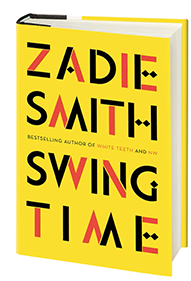
At the DuSable Museum, writer Zadie Smith discussed her new novel, the power of childhood friendship, and why having a two-year-old is like “operating a kind of fascist theocracy.” (Photography by Dominique Nabokov, courtesy Penguin Press)
The renowned novelist discusses her fifth novel, Swing Time, with assistant professor Vu Tran.
 Zadie Smith remembers a time when she deified writers. “Now I don’t have the same sense of grandeur,” she says. “I recognize writing as a psychological condition.”
Zadie Smith remembers a time when she deified writers. “Now I don’t have the same sense of grandeur,” she says. “I recognize writing as a psychological condition.”
But Smith’s devoted readership hasn’t lost that feeling of wonder. When the celebrated novelist appeared on stage at the DuSable Museum of African American History in November to discuss her new novel Swing Time (Penguin Press, 2016), the audience set down their canary-yellow hardcovers to bring their hands together in loud and enthusiastic applause. Smith subdued the greeting with a nonchalant flick of her hand.
The sold-out event was presented by the Seminary Co-op in partnership with the DuSable Museum, along with the University of Chicago’s Center for the Study of Race, Politics, and Culture; Committee on Creative Writing; and Office of Multicultural Student Affairs.
[[{"type":"media","view_mode":"media_original","fid":"3818","attributes":{"alt":"","class":"media-image","height":"358","typeof":"foaf:Image","width":"500"}}]]
Vu Tran and Zadie Smith. (Photography by @chattycee)
After taking the podium, Smith read an excerpt from Swing Time, in which the unnamed narrator reflects upon the defining friendship of her childhood. The narrator interweaves stories of adulthood with memories of Tracey—like the narrator, a biracial girl with a love of dance, navigating adolescence in northwest London's public housing. The final line of the excerpt, in which the pair, silently arranging a Barbie’s clothes after a spiteful exchange, “got that tiny white woman’s life together,” drew big laughs.
“The book portrays certain friendships as simultaneously vital and destructive,” said Vu Tran, novelist and assistant professor of practice in the arts in the Department of English, who led the conversation with Smith that followed the reading. Smith nodded and recounted a story she heard from a friend who jumped into a bush to avoid bumping into a woman who resembled someone from her school days. “That period for everyone seems to have a certain intensity,” said Smith. But especially for girls, “who form themselves in contrast to other girls.”
Girlhood is interlaced with motherhood throughout Swing Time. As a working mother of two herself, Smith has come to think of parenthood as an unfree existence. As she writes in Swing Time, “What do we want from our mothers when we are children? Complete submission.”
“It’s a relationship that involves some very basic frictions,” Smith explained. Parents and children are locked in both a battle for control and a state of mutual dependency. Parents of very young children do have a special kind of power, she pointed out. “If you have a two-year-old, you’re operating a kind of fascist theocracy."
One of the book’s defining motifs, which Tran and Smith frequently returned to in their conversation, is rhythm. Tran pointed out that the work literally swings back and forth through time. But rhythm is most prominent in the novel’s exploration of dance.
Before sitting down to write the book, Smith said that she considered whether there is a thread that runs all the way through the African diaspora. She eventually decided upon dance. Dance, to her, asks, “What is the essence of my people?” She mused that it “embodies the idea of sorrow, deep sorrow, and what people are capable of in extreme circumstances.”
Her ruminations on dance concluded the conversation, after which a lively Q&A session with the audience began. Smith respectfully fielded what she called “the Trump question,” as well as queries on cultural appropriation, her use of the first person, and her writing process. “The critical part of my brain is always on,” she said. Oftentimes, she admitted, “you have to think about the reader as someone you’re always playing on, manipulating.”
But there was no hint of manipulation in Smith’s rapport with her audience—an audience filled with fans who waited patiently in a line that wrapped well around the auditorium just to have their books signed and to exchange a few words with her.
